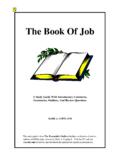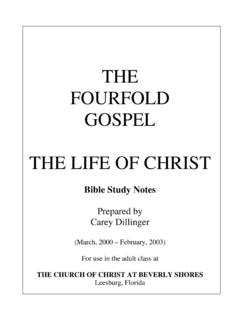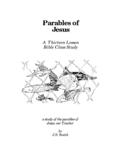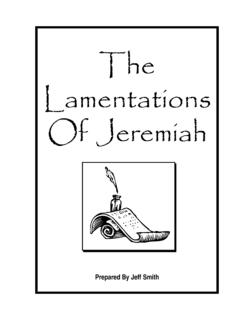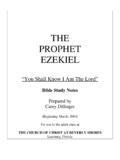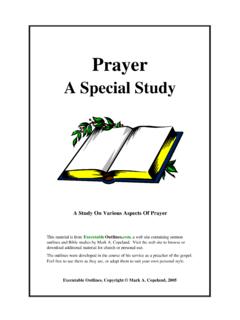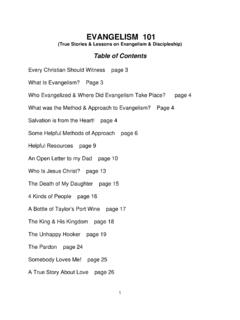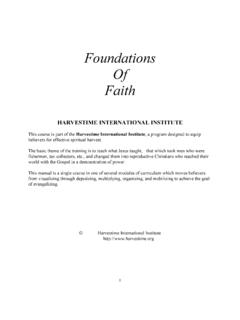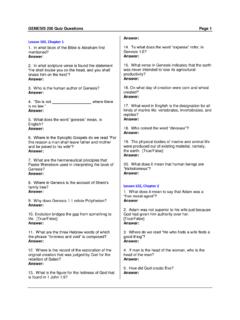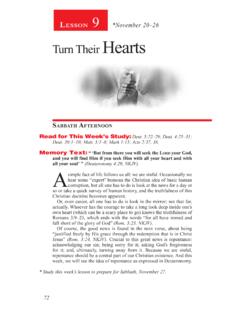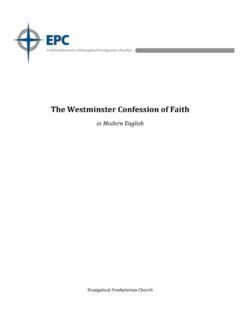Transcription of “Patience in Sufferings”
1 JOBJOBJOBJOB patience in sufferings But He knows the way that I take; when He has tested me, I shall come forth as gold. (Job 23:10) I have heard of you by the hearing of the ear, but now my eye sees you. (Job 42:5) Lessons By: Rob Harbison Job: Patience in Suffering 1 Lessons by Rob Harbison TABLE OF CONTENTSTABLE OF CONTENTSTABLE OF CONTENTSTABLE OF CONTENTS Topic Page Table of Contents 1 Introduction 2 Job 1-2 5 Job 3 7 Job 4-7 9 Job 8-10 12 Job 11-14 15 Job 15-17 18 Job 18-21 21 Job 22-26 24 Job 27-31 26 Job 32-37 29 Job 38-40:5 31 Job 40:6-42:17 34 Job: Patience in Suffering 2 Lessons by Rob Harbison INTRODUCTIONINTRODUCTIONINTRODUCTIONINTR ODUCTION Lesson 1 BACKGROUND INFORMATION Author: Anonymous.
2 The authorship of this book has been attributed to many different men including Moses, Elihu, Elijah, Solomon, Hezekiah, Jeremiah, Baruch, Ezra, Isaiah, and others. It seems reasonable to suppose that some writer living in the Golden Age of Hebrew wisdom (1000-700 BC) wrote the book . Historical Setting: There can be no doubt that Job was actually a historical character (cf. Ezekiel 14:14; James 5:11). Location: The story took place in the land of Uz (1:1) somewhere northeast of Palestine, near a desert (1:19), within raiding distance of the Chaldeans and Sabeans (1:15,17), probably between the city of Damascus and the Euphrates River. In later years it would fall under God s judgment (Jeremiah 25:20) and was home to some of the Edomites (Lamentations 4:21). Time Period: Job likely lived in the second millennium BC (2000-1000 BC) during the days of the ancient patriarchs, contemporary with the events of the book of Genesis. He was a prosperous man whose life resembles that of Abraham.
3 His wealth is measured in cattle and possessions rather than silver and gold (1:3). His longevity corresponds to that of the patriarchs after the flood, when the length of life began declining drastically (cf. Genesis 5:1-32; 11:10-26,32; 25:7). He lived 140 more years after the events of the book (42:16-17). The picture of roving Sabean and Chaldean tribesmen fit the second millennium BC better than the first. So do the seats of judgment at the gate of the city where the wise men gathered to judge matters for the people (29:7). No mention is made of Moses, the Law, or any other event or institution of the Israelite covenant and nation (although that may have been because Job was Gentile). The book Of Job: The book of Job is a true story set in poetry, which delves into the feelings and emotions of the human mind when faced with trauma and suffering, Since poetry is the language of the heart, Job reveals the innermost thoughts of men more so than outward deeds.
4 (Irving Jensen, Jensen s Survey of the Old Testament, ). It is most amazing that a book with nothing distinctively Israelite about it should find a place as part of the Hebrew canon and never be seriously challenged. This proves that the Hebrews recognized the superior message of this book from the earliest times. (Zondervan Pictorial Encyclopedia of the Bible, , ). It is quoted twice in the New Testament (note 5:13 [1 Corinthians 3:19]; 41:11 [Romans 11:35]). The book of Job is glorious because it shows people acting the way people act, rather than the way we ought to act. Job is querulous, antagonistic, bitter and despondent by turn. Surely in this Job does not set a good example. It is only as faith triumphs over despair that the example is set. (Andrew W. Blackwood, Jr., Out of the Whirlwind, ). Job: Patience in Suffering 3 Lessons by Rob Harbison And so then in this marvelous book we are privileged to gather the facts for a more complete cosmology.
5 We are given a unique behind-the-scenes look at the battle that goes on for our loyalty and souls. The book of Job dramatically sets forth a colossal war between God and Satan, and we are the territory. Satan accuses. God defends. And in the outworking of this cosmic drama is the testing of man. We write our own ending. What shall it be? Shall we relinquish our faith as we suffer or shall our faith grow stronger with each test? (Johnny Felker, Today, , , ). Message Of The book : All men suffer and struggle with the answer to the question why? God never answers that question. The answer would not help us anyway knowing certain things can never increase our faith, because faith is believing in God when we don t know or understand (2 Corinthians 5:7). When God finally speaks, He does not explain Himself, justify Himself, or excuse Himself. He merely challenges man to trust in Him. For Job, that is finally enough. There was more going on behind the scenes than Job knew.
6 The question must be answered for God, for Satan, and for us Will a man serve God for nothing? Job finally answers for all of us with an unequivocal yes! . There is a service of God which is not work for reward: it is a heart-loyalty, a hunger after God s presence, which survives loss and chastisement; which in spite of contradictory loss and chastisement; which in spite of contradictory seeming cleaves to what is God-like as the needle seeks the pole; and which reaches up out of the darkness and hardness of this life to the light and love beyond. (John F. Genung, The Epic of the Inner Life, ). Key Verses: Job 23:10; 42:5 THE PROBLEMS RAISED IN THE book OF JOB 1) Why do the righteous suffer, while on every hand the wicked are seen to prosper? This raises the question of God s justice. It brings God into judgment for His providence in allowing such. 2) Can God trust man to serve Him simply for righteousness sake?
7 This is the problem propounded by Satan, Doth Job fear God for nought? 3) Can man trust God when his suffering is inexpressible in its intensity, and unexplainable as to its cause? This was the problem with Job. 4) Is Job s theory correct: Jehovah gives, Jehovah takes; man receives both good and evil at the hand of God (1:21; 2:10)? 5) Is the friends view correct, that all suffering is punitive? (Homer Hailey, Bible Study Notes: The book of Job, ) PROPOSED SOLUTIONS TO THE PROBLEM OF SUFFERING Various solutions to the problem of suffering are expressed in the book . The prologue suggests that suffering is a test of character. The three friends opine that suffering is always punishment for sins. Job concludes that suffering is because something is out of balance in the moral universe. Elihu suggests that suffering is a call to repentance , which purifies and corrects us. The solution which God suggests is that suffering is one of the many incomprehensible, unfathomable things of life, therefore man needs to leave it all in God s hands and trust Him!
8 Job: Patience in Suffering 4 Lessons by Rob Harbison OUTLINE OF JOB Prologue: The Testing Of Job (1-2) I. Job Debates With His Friends (3-31) A. First Cycle Of Speeches (3-14) 1. Job curses the day of his birth (3) 2. Eliphaz and Job (4-7) 3. Bildad and Job (8-10) 4. Zophar and Job (11-14) B. Second Cycle Of Speeches (15-21) 1. Eliphaz and Job (15-17) 2. Bildad and Job (18-19) 3. Zophar and Job (20-21) C. Third Cycle Of Speeches (22-31) 1. Eliphaz and Job (22-24) 2. Bildad and Job (25-27) 3. Job s discourse on wisdom (28) 4. Job s defense of himself (29-31) II.
9 Speeches Of Elihu (32-37) A. First speech (32-33) B. Second speech (34) C. Third speech (35) D. Fourth speech (36-37) III. Speeches Of God (38-42:6) A. First Speech Job s Silence (38-40:5) B. Second Speech Job s Enlightenment (40:6-42:6) EPILOGUE: Job Restored Twofold (42:7-17) THOUGHT QUESTIONS: 1) Summarize the book of Job in one or two sentences. 2) What is more important in this story Job s physical condition or his spiritual condition? On which does Job concentrate? On which does the book itself center its discussion? 3) Who are the main characters in this book ? 4) Why does God never answer the question of why Job is suffering? 5) How will the lessons of this book help us relate to our own lives? Job: Patience in Suffering 5 Lessons by Rob Harbison JOB 1 JOB 1 JOB 1 JOB 1----2222 Lesson 2 KEY STATEMENT: Does Job fear God for nothing?
10 (1:9). How does this question of Satan s set the stage for the events of these two chapters? OUTLINE: I. The Testing Of Job s Faith (Job 1-2) A. Job Was Blameless (1:1-5) B. Satan s First Challenge (1:6-22) 1. Satan s Attack (1:13-19) 2. Job s Response (1:20-22) C. Satan s Second Challenge (2:1-10) 1. Satan s Attack (2:7-9) 2. Job s Response (2:10) D. Job s Three Friends (2:11-13) SUMMARY: Job was a righteous, blameless man who had apparently been blessed greatly by God (1:5). The time came for the sons of God (cf. 1:6; 2:1; 38:7) to present themselves before God and Satan came accusing Job (1:6-12; cf. 1 Peter 5:8; Revelation 12:9-10). He claimed that Job s service to God was really self-serving (1:9-11).
